The new industrial revolution? Symposium explores how 3D printing is changing health care
25 September 2018

Colleagues from across UCL joined us on Friday as we hosted the UCL 3D Printing in Healthcare Research Symposium.
Although 3D printing in health care is still in its infancy - compared with its use in other sectors – medical researchers across the University are already capitalising on this exciting new technology
Globally we have already seen enormous advances in its use in surgical planning, reconstructive surgery; printing blood vessels, bone, tissue and organs.
The benefits of 3D printing include the quick production of prototypes, the lower costs of manufacturing and the ability to create personalised, implants for individual patients who have previously had to rely on standard shapes and sizes.
Among the exciting projects discussed at the Symposium were:
UCL School of Pharmacy’s 3D printed pill, designed to release a drug slowly in the stomach over several weeks, before degrading;
The School’s development of personalised scleral inserts, designed to sit on the outside of the eye, releasing drugs to the harder to reach areas such as the retina;
The UCL Division of Surgery and Interventional Science’s work to create personalised implants to fuse the vertebrae of patients with chronic back pain;
Their bespoke cervical collar which can give a patient with paralysis of the neck a new quality of life;
How the 3D-printing of model hearts by the UCL Institute of Cardiovascular Science has impacted the way surgeons learn and patients understand complex procedures.
Dr Rui Loureiro, Head of the Department of Orthopaedics and Musculoskeletal Science, also spoke about the impressive results of their early work using 3D-printed limbs to relieve phantom limb pain.
Dr. J. Miguel Oliveira, of the Discoveries Centre for Regenerative and Precision Medicine, talked on recent advances in the development of fast-setting bioinks of natural origin.
Professor Jonathan Knowles, Head of our Biomaterials and Tissue Engineering Department, said: “This was a fantastically informative event which showcased the huge range of 3D printing work taking place across UCL.
“Here at UCL Eastman we are using it to develop custom fit maxillofacial implants that have very high strength and are also degradable. This work is in conjunction with the charity RAFT.
“I am very excited about the opportunities presented by this technology, as it potentially can be transformative for patient outcomes and improved quality of life.
Congratulations to Elena Provaggi for winning the junior investigator talks competition and to Christina Schmidleithner and Aida Navarro who won prizes for their posters.
We would like to thank LaserLines, Cellink and iMakr for their generous sponsorship of the event.
The Symposium was run by The Discoveries Centre, in partnership with the UCL Cell and Gene Therapy and Regenerative Medicine Therapeutic Innovation Network (CGRM TIN), supported by the UCL Translational Research Office (TRO).
 Close
Close




